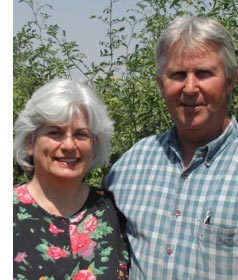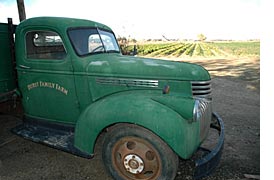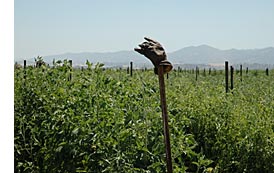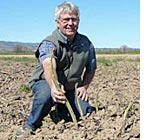Durst Organic Growers
- By Heidi Lewis
- Reading Time: 4 mins.
Farming with Heart

By Heidi Lewis
The main ingredient in good vegetables, says farmer Jim Durst, is soil: “Feed the soil, and the soil will feed the plants.” Jim and his wife, Deborah, have been farming their land at the mouth of the Capay Valley in Yolo County, CA, since the 1980s. Jim caught on to organic farming as a youngster and went on to become one of the founders of Capay Valley’s sustainable farming revolution.
Capay is a fertile valley northwest of Sacramento, known for its mild winters, hot summers, and a collection of family farmers who integrate landscape and wildlife into their farming practices. A year-round supplier of healthy, tasty food to the metropolitan areas of Sacramento and San Francisco, this valley produces a diverse bounty, from livestock and grain to veggies, olives, grapes, fruits, and nuts.
Grow What You Eat
The Dursts grow a few primary crops, spanning the seasons with spring asparagus at one end and winter squash at the other. They are known particularly for their melons, including succulent watermelons and heirloom varieties such as Charentais and Piel de Sapo (aka the Santa Claus Melon), and for hot chilies and cherry tomatoes. Jim’s motto is “grow what you like to eat.”
 Building healthy soil is one of Durst Organics’ foundational practices. Jim plants cover crops of vetch (a legume) and barley (a grass) when the fields are “resting.” Vetch stores nitrogen in its roots and barley provides carbon, and when they are plowed into the earth they supply biomass and balance the soil flora. Cover crops improve the soil’s structure, helping it to hold water, and improve the uptake of nutrients by plants. This practice comes at a cost for the farmer, who loses a year of veggie planting while the field “works under cover,” but in the long run, it provides higher crop yields and healthy produce.
Building healthy soil is one of Durst Organics’ foundational practices. Jim plants cover crops of vetch (a legume) and barley (a grass) when the fields are “resting.” Vetch stores nitrogen in its roots and barley provides carbon, and when they are plowed into the earth they supply biomass and balance the soil flora. Cover crops improve the soil’s structure, helping it to hold water, and improve the uptake of nutrients by plants. This practice comes at a cost for the farmer, who loses a year of veggie planting while the field “works under cover,” but in the long run, it provides higher crop yields and healthy produce.
To promote soil integrity and maintain its loft, Jim tries to disturb the loam as little as possible, limiting tillage and using rotary and flail mowers to avoid the soil compaction caused by the weight of heavy tractors. “Also, we pay very close attention to soil microbiology,” he told FruitGuys News. “It’s the foundation of sustainable farming systems. There is a primal connection between microbes, plants, and herbivores [like ourselves]—they are the conduit for nutrients from the soil to reach our bodies.”
Want farm-fresh fruit?
We've got you covered.Citizen Scientists
The Dursts’ farm is one of just a few from Yolo County selected to participate in the Sustainable Agriculture Farming Systems Project at University of California, Davis, which compares three types of farming systems: organic, low-input conventional, and conventional.
 “Jim and Deborah Durst have collaborated on numerous projects on sustainable agriculture and soil biology with researchers at the University of California at Davis, with funding from the USDA and the National Science Foundation,” UC Davis professor Louise Jackson told FruitGuys News. “The results [have] shown the benefits of their unique soil management practices on efficient nitrogen cycling in the soil, and the importance of soil organisms, such as mycorrhizae, for crop nutrient uptake in organic production.”
“Jim and Deborah Durst have collaborated on numerous projects on sustainable agriculture and soil biology with researchers at the University of California at Davis, with funding from the USDA and the National Science Foundation,” UC Davis professor Louise Jackson told FruitGuys News. “The results [have] shown the benefits of their unique soil management practices on efficient nitrogen cycling in the soil, and the importance of soil organisms, such as mycorrhizae, for crop nutrient uptake in organic production.”
In addition to their role as citizen scientists, the Dursts give back to their community in many ways, including planting a field of pumpkins each year for local school children to pick, hosting educational farm visits for students from preschool to the university level, supporting local non-profit organizations, and producing “meals from the field” for visiting chefs.
For Jim, living lightly on the land also means conserving energy. While the farm has a ’47 Chevy and a ’54 GMC truck used for tours and display, the farm’s workers use energy-efficient all-terrain vehicles to zip around.

“We’re trying to conserve fuel by questioning every trip we make anywhere, with any vehicle—cars, trucks, or tractors,” Jim said during a 2007 panel discussion on energy-saving farm practices. “Do I need to go to town right now, or can I wait until tomorrow and consolidate trips? I try to look at it as if I only had 10 gallons of fuel left, so I’ll wait until something is really important before using it.”
Want farm-fresh fruit?
We've got you covered.
The Dursts have spent their farming career creating and maintaining fertile land, healthy food, and community spirit. The farm’s website quotes Antoine de Saint-Exupery (author of The Little Prince):
“Only he can understand what a farm is, what a country is, who shall have sacrificed part of himself to his farm or country, fought to save it, struggled to make it beautiful. Only then will the love of farm or country fill his heart.”


